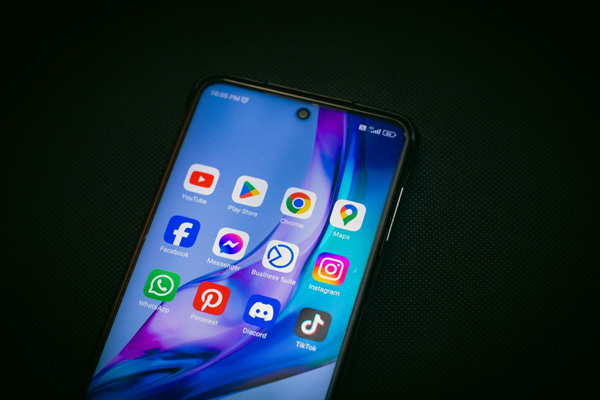Social media algorithms shape people’s opinions and give them the power to respond

[Icons on smartphone touchscreen. Photo Credit to Pexels]
U.S. Surgeon General, Vivek Murthy, MD, MBA, released a public advisory in spring 2023 regarding the effects of social media on teenagers’ mental health, citing growing concerns that platforms are contributing to anxiety, depression, and distorted self-image among young users.
"We are in the middle of a youth mental health crisis, and social media is an important factor," Murthy stated in the advisory.
The warning comes as experts examine how social media algorithms shape what young people see online.
These systems are designed to keep users engaged with their feeds for extended periods by providing similar content based on previous interactions.
While this might seem useful initially, critics argue in the end, people tend to repeat the same thoughts, jokes and political opinions.
The risk isn’t just in seeing repeated ideas; users could believe that everyone else thinks the same way they do.
This concern has been echoed by educators and researchers who say teens are increasingly exposed to narrow viewpoints.
An American businessman, Jim VandeHei has observed, “If your Facebook feed is full of junk, you must have been reading similar things before.”
Social media platforms may share content that’s shocking or controversial to drive more engagement, even if it’s not true or fair.
Because people often don’t verify the facts in short videos or rapidly-scrolled posts, misinformation can spread rapidly and appear credible.
These algorithms prioritize what they calculate people want, not necessarily what they should know.
When teenagers, who represent a substantial proportion of users influenced by trending algorithms, see their feeds become more intense as they keep scrolling, that’s exactly how the systems are designed.
These algorithms aren’t designed for brainwashing, but users’ beliefs might shift without them noticing.
If exposed to just one viewpoint, people's brains can eventually believe it is true.
This pinpoints how it usually doesn’t seem like someone is manipulating the audience; it feels like their own observation.
Following the Surgeon General’s warning, school districts in states like California and New York have begun reviewing their digital literacy curriculums.
This demonstrates why understanding the workings of these systems is crucial, especially for teenagers who are still forming their beliefs.
One way to address this issue is by watching or reading content from creators with various perspectives or by checking fact-checking sites regularly.
Other users are reducing their time online or using extensions that highlight sources that might be biased or provide independent verification.
Therefore, deleting browsing history can help the algorithm recommend something new for users to watch.
Meanwhile, disabling autoplay and notifications can reduce the amount of time spent with the app, making it harder for the algorithm to influence teenagers.
Some teens are working to improve their experiences by actively choosing what they see on their feeds.
They prefer to follow educators, scientists and activists rather than viral trendsetters.
Making these small changes doesn’t completely overthrow the system, but it helps them become more informed and active.
According to research by American journalist Nora McDonald, "Teens say they prefer a social media completely customized for them, depicting what they agree with, what they want to see and, thus, who they are."
This observation highlights that the purpose isn’t to fear algorithms — it’s to understand them better.
To achieve this, teenagers can ask themselves what’s not being shown to them once they realize the algorithm curates their feed.
In an era where people are constantly scrolling, being able to pause and seek out different viewpoints has more impact.
When people pay attention and think carefully, they won’t let others control their information.
This ability is important beyond social media; it’s what supports independent thinking.

- Alex Han / Grade 11 Session 3
- Thornhill Secondary School

![THE HERALD STUDENT REPORTERS [US]](/assets/images/logo_student_us.png)
![THE HERALD STUDENT REPORTERS [Canada]](/assets/images/logo_student_ca.png)
